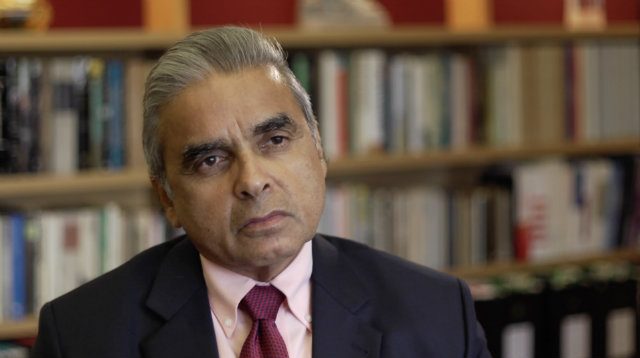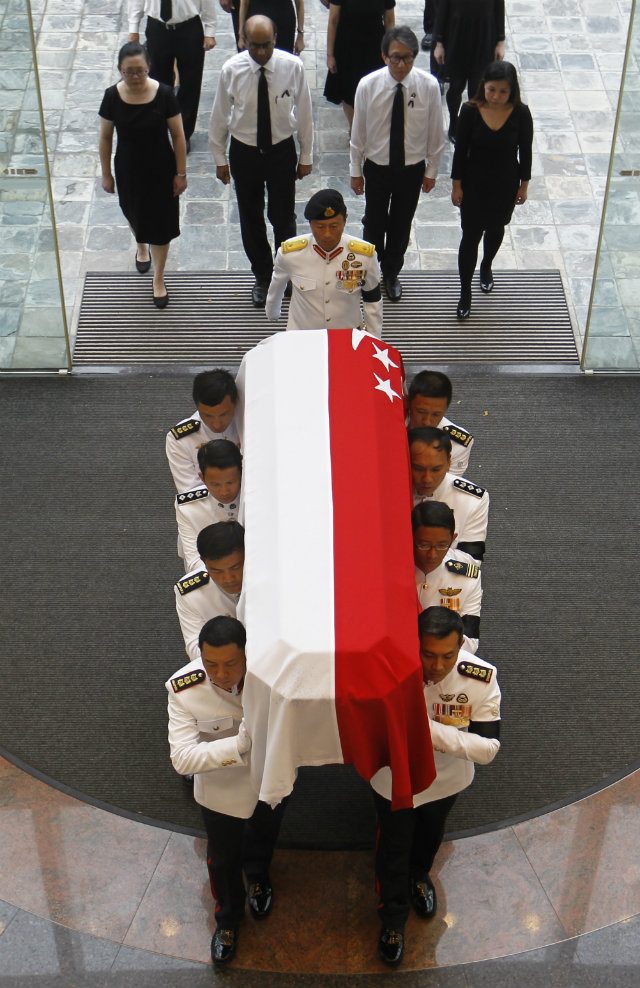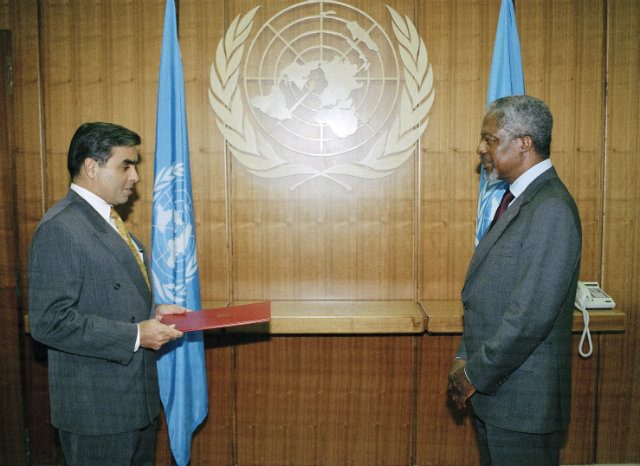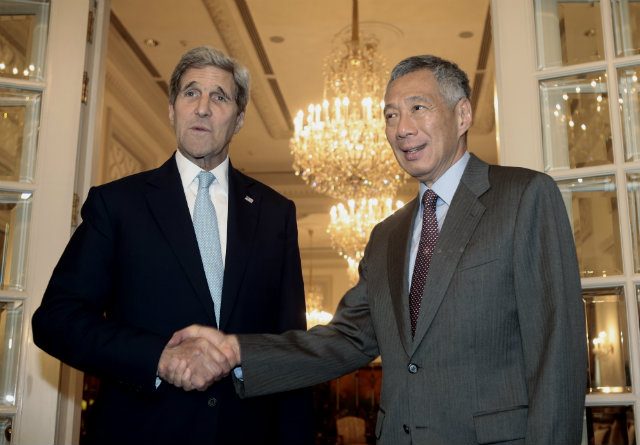SUMMARY
This is AI generated summarization, which may have errors. For context, always refer to the full article.

SINGAPORE – With the balance of power shifting to Asia, there is one city seen to be the capital of the Asian Century: Singapore.
This is how former Singapore Ambassador to the United Nations Kishore Mahbubani views the future of the city-state. As it marks the 50th year since its independence from Malaysia, Singapore celebrates its economic success but also grapples with questions about its future.
Many observers say the model that brought the Southeast Asian nation remarkable success is no longer viable, with an aging population, and a new generation of critical, educated, and global Singaporeans. Questions on leadership also arise after the death of founding father Lee Kuan Yew in March, and the 2011 elections that saw the long ruling People’s Action Party lose an unprecedented number of seats in parliament.
Can Singapore survive?
Rappler talks to the author of the book with this very title. Called one of the world’s top thinkers and “the muse of the Asian century,” Mahbubani is the dean of the Lee Kuan Yew School of Public Policy. His rise to global diplomacy from a milk program for undernourished children is cited as an illustration of Singapore’s meritocratic system.
In this wide-ranging interview, Mahbubani talks about the changing Singapore, how the Philippines can benefit from meritocracy, the Association of Southeast Asian Nations (ASEAN) and the South China Sea, the US and China, and his answer to the question he raised in his own book.
“The Asian century will need a capital city to serve the 21st century. Just as London served the European 19th century, just as New York served the American 20th century, Singapore has the opportunity to service the 21st Asian century so it’s got a tremendous opportunity here.”
Here is our full interview:
What is behind the success of Singapore?
Singaporeans should consider themselves the luckiest people in the world because no other human society has improved the standard of living of its people as quickly and as comprehensively as Singapore has done in the past 50 years. It’s been a remarkable achievement. There are many reasons of course why Singapore has succeeded.

The first is exceptional leadership. I had the great pleasure and honor of working with many of the founding fathers of Singapore: 3 in particular, Mr Lee Kuan Yew, (former deputy prime minister) Dr Goh Keng Swee and (Singapore’s first foreign minister) Mr S Rajaratnam. In terms of the quality of mind, they are comparable to the founding fathers of America. They are as bright or in some cases much brighter than the founding fathers of America.
So it was exceptional leadership. Also good governance, and in particular, 3 principles of good governance have helped Singapore: meritocracy, pragmatism, honesty. By implementing these 3 principles of good governance, Singapore has done exceptionally well.
Your own life story is said to be an example of Singapore’ meritocracy. How did you benefit from this system?
I was very lucky because I was born in a very poor family in a very poor Singapore. Singapore’s per capita income when I was young was the same in Ghana in Africa and my family was also very poor. I was put in a special feeding program. We lived on social welfare, and so I went through very hard times and the reason why I succeeded in my life is because of Singapore’s policy on meritocracy so throughout my school years when I did well, I got bursaries to support me. When I went to university, I got the president’s scholarship.
After I graduated with first class honors in philosophy, I was admitted to the administrative service of Singapore, which is the elite service of Singapore on the basis of merit because I had absolutely no family connections, in fact no ethnic connections with anybody in the Singapore leadership because I belong to a minority within a minority.
Singapore’s population is 75% Chinese, 15% Malay, 6 to 8% Indian but most come from South India. I come from North India and I was Sindhi so it was quite remarkable that a person was born in a minority group within a minority group in a very poor family can be so successful. And that’s the result of meritocracy in Singapore.

Is the Singapore model replicable?
I give a lecture at the Lee Kuan Yew School of Public Policy, and the title is: The Secrets of Singapore Success, and I give the secrets away free of charge. I always say any country in the world, any organization in the world will do well if it implements meritocracy, pragmatism. When you choose one country, the Philippines could have a GNP that is 10 times the current size if you implement meritocracy, pragmatism, and honesty. I say this because Filipinos are among the most talented people in the world today.
If you travel around the world, you go to New York, California, you will see how successful the Filipino communities are, and so it shows you the potential of the Philippines’ population is enormous. There’s absolutely no reason why the Philippines should not be like Germany or France, a developed country. You have the potential. All you have to do is implement meritocracy, pragmatism, honesty.
It’s absolutely not unique to Singapore. I think if there’s one country that will definitely succeed with meritocracy, pragmatism, honesty, that’s the Philippines. I’ve seen how successful the Filipino community is outside the Philippines and so the obvious question to ask is: why? Why is the Philippine community inside the Philippines not as success as the Philippine community outside? So it’s a question about which policies you implement.
So the most important thing about meritocracy is your destiny is not determined at birth. Right now, if you’re born in Makati, you know you’ll succeed and if you’re born in the slums in Manila, your chances of success are very low. But you can change that. You can decide that someone born in the slums should be given the equal opportunity to prove that he has a brain as someone born in Makati.
That’s what meritocracy is about. We don’t look at where they are born. We just assume everyone should be given the chance to prove they are good, and you give them the chance, you will have tremendous reservoirs of brain power in the Philippines you can exploit.
You say Singapore is at an inflection point. Where do you see it headed?
If you ask me to state what is the most probable outcome, Singapore has a shining future waiting for it. And one key reason is that when I was a young child in a poor Singapore in a poor Southeast Asia, we were located in the wrong side of the world. We should have been in Europe, America.
Today, the center of gravity of the world’s economy has moved close to Singapore and the 21st century will be the Asian century. And the Asian century will need a capital city to serve the 21st century. Just as London served the European 19th century, just as New York served the American 20th century, Singapore has the opportunity to service the 21st Asian century so it’s got a tremendous opportunity here.
The reason why Singapore can do this is it’s the only modern Asian city that sits comfortably with all the 4 civilization streams now operating in a big way in Asia: the Chinese civilization stream, the Indian civilization stream, the Islamic civilization stream, the Western civilization stream, and the one city where these 4 civilization streams meet and co-mingle and live happily with each other is Singapore. So Singapore has the chance to be the capital of the Asian century, the 21st century.

You say a threat to Singapore is when leaders become populist and cater to voters’ short-term demands. How do you foresee the upcoming elections playing out?
The ruling party, the People’s Action Party will win the elections, as always. But at the same time, will it face more political challenges? Yes. I think the Singapore political environment which went through a couple of decades of not being very competitive has now become far more competitive. It became competitive in the last elections. The Singapore government got a shock because for the first time, it lost something called a Group Representation Constituency or GRC.
Three ministers lost their seats: the foreign minister George Yeo, the second minister of finance Lim Hwee Hua, the senior minister of state and foreign affairs Zainul Abidin. That hasn’t happened for a long time in Singapore, ministers losing their seats in elections. That was a shock to the Singapore political system and so I expect in the next elections which will probably be held this year or by the latest next year, it will be much more competitive, and much more challenging.
How should Singapore address immigration and inequality?
The first thing Singapore should learn from the Philippines how to have more babies. Philippines is a country that’s blessed with lots and lots of babies. You are replacing your population. Singapore’s fertility ratio is very low, 1.5, 1.2 and we are clearly not replacing our population so we need to do something.
For a long time, the government tried various economic incentives, baby bonuses, but people don’t have babies for economic reasons. They do it out of love, affection so you have to think much harder about what you do to create a more livable, family-friendly city. It’s a comprehensive thing. It’s not something you can just say it’s about giving 1,000 dollars more and so on. It’s a big challenge, and we haven’t found the answers so far.
Similarly, because we are not replacing our population. We have a rapidly aging society. We don’t have enough workers so we have to import foreign talent but as the last election showed, that’s politically a very difficult thing to do in Singapore.
So the government’s got to manage these tension between on the one hand bringing in foreign workers to suit the economic demands of Singapore, and at the same time reducing the number of foreign talent to meet the political demands of Singapore. Maintaining that balance is a very difficult challenge.
You say Singapore should be the cheerleader of ASEAN. How would you assess regional integration set this year?
I’m one of the biggest supporters of ASEAN. My next book will be on ASEAN. ASEAN is a breathing, living modern miracle because it has taken a region far more diverse than any other region in our planet because we have greater diversity of race, language, religion, language, culture, history than any other region on planet earth, and we’ve made it a peaceful region. For that reason alone, ASEAN alone deserves a Nobel Peace Prize. It’s performed a miracle in what it has achieved in this region.
ASEAN has been very helpful in promoting economic cooperation. One reason why the ASEAN countries are thriving is because they’ve open up their economies and they’ve also signed free trade agreements with China, India, Japan, Australia, South Korea, New Zealand, so on and so forth.
But it would be a mistake for ASEAN to be complacent because ASEAN could be left behind when China and India take off in a big way. It’s important if ASEAN wants to compete with China and India in a big way, you have to move to setting up an ASEAN Economic Community which is the goal for 2015. Singapore has been one of the biggest supporters and will continue to remain a big supporter.
How can Singapore help ASEAN be more competitive?
Singapore has been very helpful to ASEAN in many ways, either through direct assistance through the Singapore cooperation program, providing ideas for ASEAN integration but the most valuable thing Singapore can do is to be a catalyst for change.
I’ll never forget, the former Foreign Minister of Indonesia Ali Alatas once told me the story, which is very telling, he said for many years, Indonesia will send its urban planners to the best European cities, to Amsterdam, London and Paris and they will study urban planning in these cities, come back, and write a beautiful report and write the last paragraph: “But Amsterdam is in Europe, Jakarta is in Asia. We in Asia cannot do what Europe can do.” Signed, filed away.
One day by mistake they came to Singapore. They wrote a wonderful report on urban planning in Singapore, in the last paragraph they put: “Singapore is in Europe.” Singapore is not in Europe but in Asia so they said, “Hey, maybe we in Asia can build a city as beautiful as the European city.” So that’s a remarkable story. It shows you that the best thing Singapore can do is to introduce all kinds of economic, social changes that others can say, “Hey, if Singapore can do it, we can do it.”
In terms of attracting foreign investment, for many years, Singapore used to produce a wonderful investment brochure. And one day the best thing Malaysia did was to take the same investment brochure and they only changed one word. Every time it said Singapore, they changed to Malaysia. Every incentive Singapore gave for foreign investment, Malaysia gave. Malaysia got tremendous more foreign investment, and that made Singapore very happy. It’s good for Singapore if Malaysia, Indonesia, the Philippines get a lot of foreign investments by copying our investment brochures. That’s wonderful.

You said the friendship between Lee Kuan Yew and the late Indonesian President Suharto strengthened ASEAN. How?
I think that was a very, very critical relationship that actually ensured the stability of Southeast Asia for at least 3 decades. I think after President Suharto came to power in 1965, the first few years of the Singapore-Indonesia relationship were very difficult. Partly because of confrontation and two Indonesian marines exploded a bomb in Singapore. They killed some Singaporeans and the two marines were hanged.
President Suharto was very angry with Singapore. Mr Lee Kuan Yew went to Jakarta, sprinkled some petals on the grave of the two marines to close that chapter, and President Suharto and Mr Lee Kuan Yew established a close relationship that lasted 30 years, all the way to 1998 when President Suharto stepped down.
I think Mr Lee Kuan Yew’s big advantage was he was a big geopolitical thinker, one of the best of all. He could connect with President Suharto, and they could both talk about what to do about Southeast Asia. As a result of that, I’m sure one of the reasons why ASEAN is so successful is because of the close relationship between the most populous country, the largest country in Southeast Asia, and Singapore which is the smallest country in Southeast Asia. That friendship provided an anchor for the development of ASEAN.
One of the foreign policy challenges Singapore faces is the geopolitical rivalry between the US and China. How should Singapore position itself?
Singapore will be put in a very tough spot in this rivalry between the US and China because we have equally close relationships with both of them. It’s like having to choose between two of your best friends. We have a close defense and economic relationship with the US. We have a strong economic and cultural relationship with China because 75% of our population is Chinese so having to choose between the two would be a nightmare for any Singapore government.
So it’s good for Singapore that both of them have a good relationship so far, and all of us in Southeast Asia including the Philippines should aspire to see a good relationship between the two of them rather than intense rivalry because if there’s intense rivalry between the two of them, we will be caught in between.
There’s an old Sri Lankan proverb that says when elephants fight, the grass suffers. But the Sri Lankans are very wise. They also add but when the elephants make love, the grass also suffers. So we have to watch very closely these two elephants and ensure that the relationship between the two of them, they neither fight or make love too much.

What role should ASEAN play in the South China Sea dispute?
I think it’s very important that the ASEAN countries keep the South China Sea issue as one that should be resolved only among the claimant states so between the 4 ASEAN claimant states, and China and Taiwan. It should not become a global geopolitical issue because if it becomes a global geopolitical issue, it gets much more complicated.
For example, it’s easier for China to make compromises to a weaker Southeast Asian country like the Philippines because China’s a great power so it’s expected that China should be magnanimous to a smaller, weaker country like Philippines and not bully the Philippines. But if you bring the US in and the US becomes a player then it’s much harder for China to make compromises to a great power US because it’s seen as a sign of weakness, not as a sign of strength.
So it becomes much more complicated if the South China Sea issue gets caught in geopolitics so it’s better not to bring it at a geopolitical level, keep it at a low level, and try to keep the temperature as cool as possible on the subject. For example, one great idea will be to have a one-year moratorium where everybody agrees we don’t do anything to change the facts on the ground.
Is there a role for ASEAN in resolving the dispute?
The ASEAN as an organization has no say in the dispute but ASEAN can play a role in terms of lowering the temperature on the subject that’s why it’s good to have on the subject what they call a Code of Conduct being developed. That’s something ASEAN can contribute. But it’s more likely to work out such a Code of Conduct if the temperature can be lowered and not raised on this subject.
What can Southeast Asia learn from Singapore, and what can Singapore learn from Southeast Asia?
I think Singapore can learn a lot from Southeast Asia. In my book on ASEAN, I speak about the 4 waves of cultural influence that came into Southeast Asia. First you have the Indian wave, and as you know it left a deep imprint on Southeast Asia culture. In Indonesia, the Wayang Kulit, the status and the Mahabharata and Ramayana, that’s an amazing impact of the Indian wave, also the Chinese wave.
One reason why Southeast Asia is successful is because it has a very strong, successful Chinese communities in Southeast Asia then the Western wave, before that the Islamic wave. Islam arrived peacefully in Southeast Asia and converted a lot of people to Islam. Then you had the Western wave, the most violent wave, which led to the colonization of Southeast Asia.
So as a result, Southeast Asia is an amazingly complex cultural environment, and Singapore is so lucky it is in such an interesting complex cultural environment it can learn a lot from.
Southeast Asia can also learn a lot from Singapore. Singapore has learned all the best practices from the rest of the world. Singapore is in some ways one of the best copycat countries in the world. Whatever Singapore has copied from the other countries, we invite the ASEAN countries to copy from Singapore. That will lead to a better Southeast Asia. – Rappler.com
This week, Rappler puts the spotlight on Singapore as the city-state celebrates its 50th anniversary on August 9. We take a look at the forces that shaped it, and what lies ahead.
#SG50: Rappler Talk: Singapore after LKY – legacy, leadership, and change
#SG50: Crowdsourced list: Filipino trailblazers you should know
#SG50: Foreign workers less welcome in Singapore?
#SG50: ‘Philippines can succeed like Singapore’
#SG50: The MRT in Singapore and Manila
#SG50: Singapore’s vision of a Smart Nation
#SG50: Smart Nation: The future of Singapore’s wired city
#SG50: Around Singapore in 16 dishes
Add a comment
How does this make you feel?
There are no comments yet. Add your comment to start the conversation.